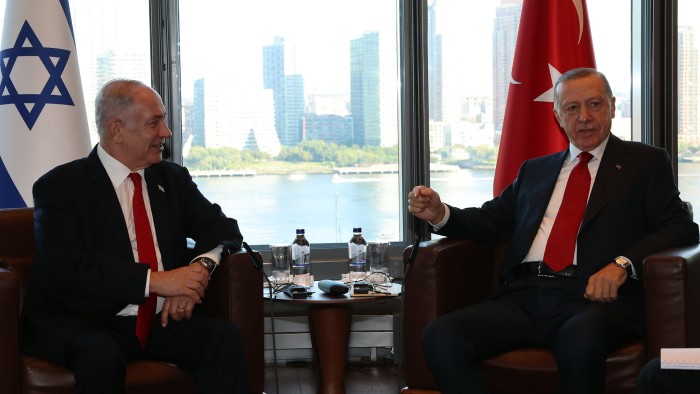Unlock the White House Watch newsletter for free
Your guide to what Trump’s second term means for Washington, business and the world
The writer is director of The Turkey Project at the Brookings Institution.
The 12-day war between Israel and Iran has redrawn the power balance in the Middle East. An emboldened Israel seeking to remake the region; a weakened Iranian regime seeking to survive; and a hesitant United States, reluctant to be drawn into another prolonged conflict. The most dangerous consequence may not lie in further fighting with Iran — but in the emergence of a more fierce competition between Turkey and Israel.
Turkish foreign minister Hakan Fidan recently captured the new mood in Ankara, telling a summit of the Organization of Islamic Cooperation: “There is no Palestinian, Lebanese, Syrian, Yemeni or Iranian problem — but there is clearly an Israeli problem.” That sentiment reflects a shift in Turkish thinking on Israel’s place in the region; once an ally, then a rival, it is now increasingly seen as an outright adversary. Ankara is uncomfortable with Israel’s assertiveness and emboldened new identity as the region’s hegemon — a role that Turkey’s President Recep Tayyip Erdoğan had long coveted. Devlet Bahçeli, a key Erdoğan ally, recently accused Israel of trying to “encircle Anatolia” and destabilise Turkey. Once confined to tabloid headlines, such thinking is no longer fringe within the Turkish bureaucracy and mainstream media.
A mirror image of this obsession exists in Israel, where parts of the security establishment increasingly view Turkey’s regional influence as a long-term threat “more dangerous than Iran”. Erdoğan’s public support for Hamas has provoked sharp reactions from Prime Minister Benjamin Netanyahu’s government, triggering vitriolic exchanges and fuelling Israeli outreach to Syrian Kurds, whom Ankara has long viewed as a threat. In an already unstable region, a duel between two of the region’s strongest militaries — both US allies — could further erode the fragile balance of power.
The conflict is both ideological and geopolitical. Erdoğan’s government has fused Sunni Islamist populism with Turkish nationalism, epitomised by his “Century of Turkey” platform promising to usher in an era of Turkish power abroad. In Israel, a far-right coalition holds an equally deterministic view of Israel’s destiny, pursuing military dominance across Lebanon, Gaza, and Syria. These competing world views leave little room for compromise.
Syria is the most immediate arena for confrontation. Since the Assad regime’s collapse in late 2024, both countries have sought to shape the postwar order. Turkey has expanded its influence in Syria, backing its allies who now hold power and pushing for a stable, centralised government aligned with Ankara. Turkey already controls swaths of northern Syria and is keen to expand its economic and military footprint across the country. Israel, meanwhile, has stepped up air strikes and expressed support for Kurdish and Druze autonomy, viewing Syria’s new rulers with suspicion due to their jihadist roots.
Tensions peaked in April when Israel bombed a site earmarked for a Turkish base. A military hotline now exists, but broader diplomatic engagement is frozen. Meanwhile Turkey has drawn its own conclusions from the Iran war. Israel’s decapitation of Iranian military leadership is a stark reminder of its superior air power and intelligence capabilities. Ankara is now moving to address its own vulnerabilities.
US President Donald Trump must use his good relationship with both Netanyahu and Erdoğan to manage this confrontation. Ending the Gaza war could help alleviate Turkish grievances, but the longer-term rivalry between the two countries is unlikely to fade.
For decades, US policymakers treated Turkey and Israel as indispensable — if difficult — allies and pillars of regional stability. Now those two pillars are pressing directly against one another. With Iran weakened, Washington and its allies must recognise that the Middle East’s next test may come from rivalry between two of their closest partners.
